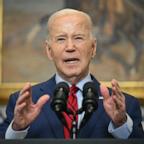Poll: Public Not Punitive on China Policies
April 24 -- Americans are not in a punitive mood when it comes to relations with China: Most oppose advanced arms sales to Taiwan, most favor a neutral stance on the 2008 Olympics, and views on free trade remain divided, with no change since the spy plane tangle.
A new ABCNEWS/Washington Post poll found 67 percent say the United States should not sell advanced weapons to Taiwan. And if such an arms sale would "seriously damage" U.S. relations with Beijing, opposition rises to 75 percent.
That seems to comport with President Bush's decision Monday to defer selling Taiwan advanced destroyers that use the missile-tracking Aegis radar system. The United States will offer four less-sophisticated destroyers, eight diesel submarines and other weapons.
Divided on Olympics, Trade
On the Olympics, just over a fifth of Americans, 23 percent, say Washington should oppose China's bid to host the games. But about as many would support China's bid, and most, 54 percent, say Washington should just stay neutral on the issue.
The public is divided on another issue in U.S.-China relations, free trade: 48 percent favor it, 45 percent are opposed. But that's essentially the same as it was in polls last year and in 1998.
Chinese-American relations grew testy after the collision of a U.S. spy plane and a Chinese fighter over the South China Sea early this month. The U.S. crew was released after Washington expressed sorrow, but China still holds the plane. The poll found 67 percent of Americans approve of Bush's handling of U.S.-China relations.
Conservative Republicans are among the most hawkish groups on China; 49 percent support selling advanced weapons to Taiwan. By contrast, young adults, aged 18 to 30, are much more likely to oppose the weapon sales (76 percent), to favor free trade with China (63 percent) and to support China's Olympic bid (30 percent).
Methodology
This ABCNEWS/Washington Post poll was conducted by telephone April 19-22 among a random national sample of 1,350 adults. The results have a 2.5-point error margin. Data collection and tabulation were done by TNS Intersearch of Horsham, Pa.




